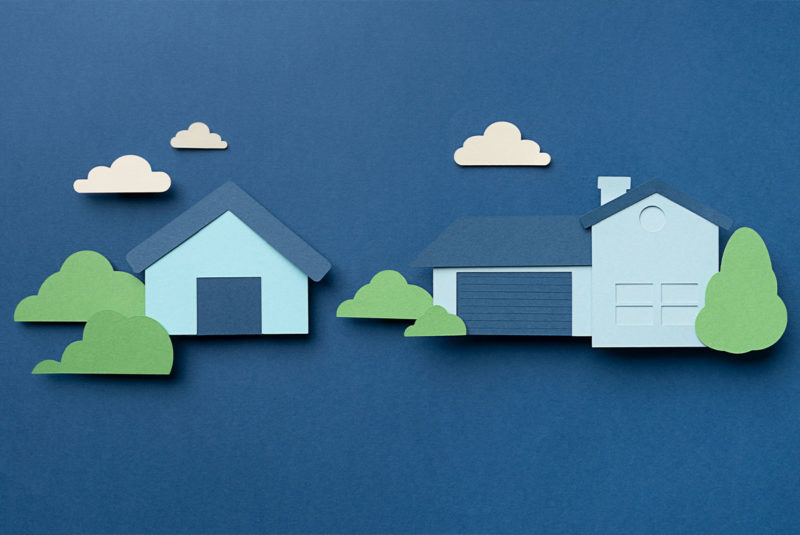Ready To Buy a Home?
Get Approved to Buy a Home
Rocket Mortgage® lets you get to house hunting sooner.
Many people think that buying a second home or vacation home will never be more than a pipe dream – believing that this kind of purchase is exclusive to the rich and famous.
Sometimes, that second property isn’t about living a lavish lifestyle. For many people, a second home is an investment.
And if you’re smart with your approach, buying a second home is totally doable.
1. Decide if a Second Home Is Right for You
Before you dive too deep into the process, figure out if buying a second home is right for you. Let’s assess some of the pros and cons:
| Pros of Buying a Second Home | Cons of Buying a Second Home |
| ✅ Possibility to rent it out as a vacation home for extra income ✅ You have a secured vacation spot, a place to retreat to while you’re building up your retirement savings ✅ Vacation homes are more likely to increase in value, resulting in long-term profits | ⛔️ Finding and dealing with renters can be difficult ⛔️ Property taxes can be high, and property tax deductions come with limitations ⛔️ It may be harder to take other vacations ⛔️ Buying a second home can be very expensive, especially when you take maintenance, mortgage, utilities and insurance costs into account |
2. Find Out if You Qualify
Again, before you get too far ahead of yourself, figure out if you meet the qualifications to buy a second home. Take a look at your:
Credit score
Like so many major financial purchases, your credit score plays a big role in determining if you qualify for a second home.
To qualify for a conventional mortgage for a first home, you typically need a credit score of at least 620. But for second homes, your credit score may need to be higher.
Generally, you’ll need a credit score of at least 680 to qualify for a mortgage for your second home. If your credit score falls short of 680 (in the range of 640 – 679), some lenders will still approve you if you agree to a 25% down payment or more.
Of course, a credit score higher than 680 is ideal. The higher your credit score is, the better your interest rate will be. When applying, you can make sure your credit rating is as high as possible by:
- Not opening new accounts
- Not closing old accounts
- Paying down your credit card balances
Debt-to-income ratio
Your idea of a good time probably doesn’t involve figuring out how much of your income you’re putting toward your debts. But if you want to make that second home on your Pinterest board a reality, you need to crunch some numbers.
To be approved for a second mortgage, you need to meet debt-to-income ratio guidelines. The maximum debt-to-income ratio (DTI) for buying a second home is usually 45%, according to the Fannie Mae selling guide.[1]
Here’s the formula for calculating the debt-to-income ratio:
Total Monthly debts/Pretax Monthly Income x 100 = DTI %
Your total monthly debt payments will include everything from credit card debt and student loan debt to car payment debt. When figuring out your pretax income, don’t include any potential income you could make from renting out the property.
Overall financial picture: Crunch those numbers
While you might qualify for a second mortgage on paper, it’s still a good idea to crunch the numbers to see if buying a second home makes financial sense.
To figure it out, add up all your monthly expenses and subtract them from your monthly post-tax income.
Whatever is left over has to cover the second mortgage, upkeep costs, property taxes, homeowner association fees and other expenses that come with owning a second home.
3. Figure Out How You’ll Finance It
If you qualify for a second home, it’s time to dive into the nitty-gritty of deciding how you’re going to finance one:
Home equity financing
Using the home equity you’ve built into your first home is one of the most popular ways to finance a second home. With this financing method, you’ll have access to large amounts of cash while scoring low interest rates.
There are two main types of home equity financing: home equity loans and home equity lines of credit (HELOCs).
Cash-out refinancing and conventional mortgage loans
Cash-out refinancing allows you to refinance the mortgage on your first home AND borrow money at the same time. This is a great option if mortgage rates are lower than what you’re currently paying.
Of course, you can always go the traditional route and apply for a conventional home mortgage. If you financed your first home with a conventional mortgage, you’ll be pleased to know the second go-around is pretty much the same song and dance.
But because lenders see second homes as riskier, the qualification requirements are a bit stricter.
4. Hire a Local Real Estate Agent
You’ve crunched the numbers to see if you qualify for a second home, and you’ve figured out how you’re going to finance it. Now, it’s time for the fun part: hiring a real estate agent and shopping for your new dream home!
When searching for a real estate agent, it’s always best to go local. A local real estate agent will know the ins and outs of the area, and they can use their network to set you up with local contractors. A local real estate agent can also provide you with inside info on:
- Current market prices
- The pros and cons of a particular home
- Preferable neighborhoods
- Potential resale values
- Price histories for comparable properties
- Nearby amenities
Besides going local, make sure you only work with a buyer’s agent. Working with a dual agent – who represents both you and the seller – could potentially create a conflict of interest.
5. Shop ’Til You Drop … A Down Payment
Once you have your trusty agent by your side, it’s time to begin the hunt for the perfect home.
| DO | DON’T |
| 👍 Try it on for size. Shopping for a second home is the perfect excuse for a vacation. Get to know the area by visiting and living like a local. Chat with other locals about why they like (or don’t like) the area. 👍 Consider a fixer-upper. Instead of buying someone else’s dream home, create your own by investing in a less-than-perfect property. 👍 Think untraditionally. Traditionally, family homes are great, but keep your mind open to condos, townhomes and other property types. | 👎 Impulse buy. It may be tempting to buy on a whim right after you get home from a dream vacation, but do your research to ensure that you find the right home for your needs. 👎 Underestimate location. “Location, location, location” is a real estate mantra for a reason. When narrowing in on the location, keep in mind how often you want to use the home. If you want a weekend getaway spot, it makes sense to choose a home in a location that’s an easy commute from your primary residence. |
(Second) Home is Where the Heart Is
With these tips in your back pocket, you’ll be more than ready to buy a second home. While buying a second home can be a lot of work, realizing your dream will make it all worth it. 🏡🏡
Get approved to buy a home.
Rocket Mortgage® lets you get to house hunting sooner.
The Short Version
- Buying a second home can be a great option for those looking for a vacation spot or investment property
- To qualify for a second home, you’ll need to be in good financial standing with a solid credit score and debt-to-income ratio
- Take into account various financing options for a second home. Once you’re approved, hire a local real estate agent
Fannie Mae®. “What is the maximum DTI ratio allowed?” Retrieved November 2021 from https://selling-guide.fanniemae.com/Selling-Guide/Origination-thru-Closing/Subpart-B3-Underwriting-Borrowers/Chapter-B3-6-Liability-Assessment/1064501811/What-is-the-maximum-DTI-ratio-allowed.htm




